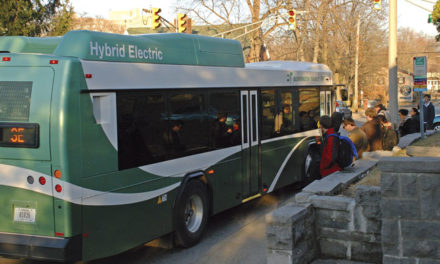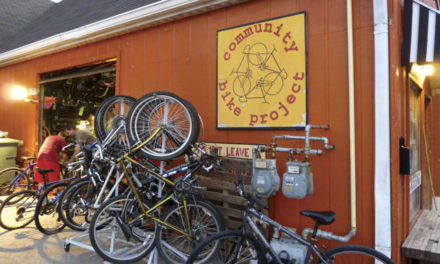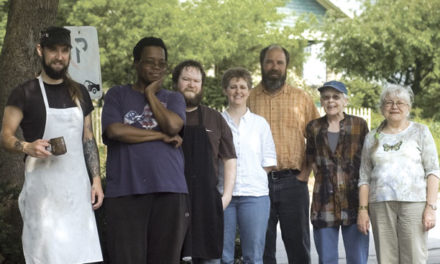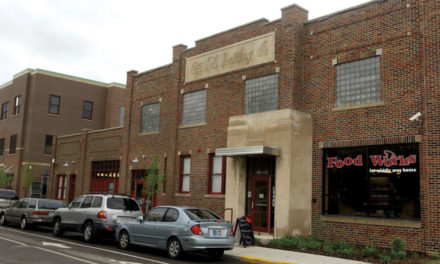
(l-r) Bloomington Mayor John Hamilton and Jody Madeira. Photos by Stephen Sproull, Jim Krause
BY SUSAN M. BRACKNEY
State legislators may squawk about federal government overreach, but most states, including Indiana, have their own “home rule” laws enabling them to snatch powers preemptively from cities, counties, and other political subdivisions.
“I think it happens where you have significant differences between a city and a state,” says Bloomington Mayor John Hamilton. “There can be a temptation on behalf of the state to make the city toe the line. It’s certainly true here.”
For instance, home rule legislation put to rest a Bloomington ban on the retail distribution of plastic shopping bags. In 2014, Bring Your Bag Bloomington (BYBB), a local sustainability group, began working with city leaders to phase out the bags. “We put a lot of time and energy into writing the ordinance, doing research, and getting support from all kinds of local groups, only to have the rug pulled out,” BYBB cofounder Libby Gwynn recalls.
Introduced in January 2016 and passed by March, House Bill 1053 stripped political subdivisions’ power to adopt ordinances like BYBB’s. “We were incredibly disappointed and infuriated,” Gwynn says. “They got wind of our project and nipped it in the bud.”
According to Jody Madeira, a professor at the Indiana University Maurer School of Law, home rule originated in the 1980s in response to firearms ordinances in cities like Chicago and New York. “Municipalities started to pass laws restricting handguns, but it really picked up after cities started suing gun manufacturers and sellers for negligence in the 2000s,” Madeira explains.
Conservative governments, particularly, took notice. “They thought this was an unusually dirty trick,” she says. Gunmakers alerted the National Rifle Association (NRA), and NRA lobbyists pressured lawmakers, and preemptive legislation quickly appeared. Congress also passed the Protection of Lawful Commerce in Arms Act, shielding lawfully acting gun manufacturers and sellers from lawsuits. Now, although local officials might prefer that Bloomington public pools and parks be handgun-free, enacting such regulation is against state law.
“So, we have these preemption laws, and state legislatures are like, ‘Hey, this works pretty well!’” Madeira notes. States began preempting ordinances ranging from Airbnb rental restrictions to pro-sanctuary city designations.
Here, home rule hamstrings Bloomington’s ability to set minimum wage laws, to institute affordable housing policies using inclusionary zoning, to maintain property using tax increment financing, and more. “Another example locally is improving our bus system,” Hamilton says. “I believe the community would support a modest, dedicated income tax that would help us expand to Sunday service or expand our bus system, but we’re not allowed to put that tax in place unless the state specifically lets us, and they’ve declined to do that.”
Among the state’s most breathtaking maneuvers? Sliding a last-minute section into the state budget that voided Bloomington’s proposed annexation of several outlying areas and prohibited further annexation attempts until 2022. Never mind that the Indiana Constitution forbids special legislation. “The legislature cannot pass a law that applies only specially to one jurisdiction—and it’s our view that that’s exactly what they did with the annexation legislation,” Hamilton says. As such, the City of Bloomington v. Eric Holcomb is currently meandering through the legal system. “We’ll see how that comes out,” Hamilton adds.
While the state may not allow local governments to enforce changes people would like to see, sometimes taking a more grassroots approach can work to achieve the same ends. For example, BYBB visits area schools and grocery stores to demonstrate how to make no-sew, reusable shopping bags. And businesses are responding to customer feedback. By 2025, Kroger will ditch plastic bags nationwide. “These days it’s very easy to feel discouraged,” Gwynn says. “But I’m even more passionate about it now than I was before.”
As for state legislatures, Hamilton feels they don’t seem to understand the negative impact of their overreach. “They seem to want to act like a city council at the state level,” Hamilton says. “I do think it’s very short-sighted not to allow more diversity and innovation at the city level.”








The state law about airbnb does all for local regulation, which Bloomington still has not opted to do. Perhaps if Hamilton required permits and collected tax for local airbnbs he could pay for Sunday buses.